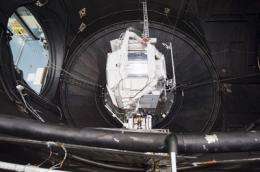Alpha Magnetic Spectrometer experiment takes off for Kennedy Space Center

The Alpha Magnetic Spectrometer (AMS), an experiment that will search for antimatter and dark matter in space, leaves CERN next Tuesday on the next leg of its journey to the International Space Station. The AMS detector is being transported from CERN to Geneva International Airport in preparation for its planned departure from Switzerland on 26 August, when it will be flown to the Kennedy Space Center in Florida on board a US Air Force Galaxy transport aircraft.
AMS will examine fundamental issues about matter and the origin and structure of the Universe directly from space. Its main scientific target is the search for dark matter and antimatter, in a programme that is complementary to that of the Large Hadron Collider.
Last February the AMS detector travelled from CERN to the European Space Research and Technology Centre (ESTEC) in Noordwijk (Netherlands) for testing to certify its readiness for travel into space. Following the completion of the testing, the AMS collaboration decided to return the detector to CERN for final modifications. In particular, the detector's superconducting magnet was replaced by the permanent magnet from the AMS-01 prototype, which had already flown into space in 1998. The reason for the decision was that the operational lifetime of the superconducting magnet would have been limited to three years, because there is no way of refilling the magnet with liquid helium, necessary to maintain the magnet's superconductivity, on board the space station. The permanent magnet, on the other hand, will now allow the experiment to remain operational for the entire lifetime of the ISS.
Following its return to CERN, the AMS detector was therefore reconfigured with the permanent magnet before being tested with CERN particle beams. The tests were used to validate and calibrate the new configuration before the detector leaves Europe for the last time.
"The entire AMS collaboration is delighted by this departure, because it marks a crucial milestone for the experiment. We are getting close to the space shuttle launch and the moment when our detector will finally be installed on board the ISS," explained Professor Sam Ting, Nobel laureate and spokesman for the experiment. "The detector's construction phase is now finished and we are eager for the data collection phase to begin."
"The launch of AMS detector is very timely," added Roberto Petronzio, President of the Italian National Institute for Nuclear Physics. "Today we are well aware of our ignorance of Universe's most abundant constituents and we still challenge the puzzle of matter-antimatter asymmetry. Furthermore, recent results from the Pamela experiment suggest scenarios for important discoveries for AMS. The experiment stems from a large international collaboration joining the effort of major European funding agencies with the US and China."
Upon arrival at the Kennedy Space Center, AMS will be installed in a clean room for a few more tests. A few weeks later, the detector will be moved to the space shuttle. NASA is planning the last flight of the space shuttle programme, which will carry AMS into space, for the end of February 2011.
Once docked to the ISS, AMS will search for antimatter and dark matter by measuring cosmic rays. Data collected in space by AMS will be transmitted to Houston (USA) and on to CERN's Prévessin site, where the detector control centre will be located, and to a number of regional physics analysis centres set up by the collaborating institutes.
Provided by CERN

















